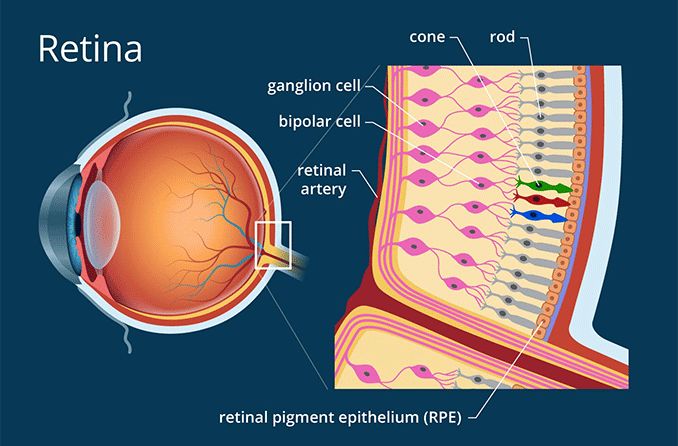The retina: Where vision begins

The first step in the process of vision takes place in the retina. In this light-sensitive tissue in the back of the eye, light energy is transformed into impulses that can be interpreted by the brain.
Retina definition
The retina is the sensory membrane that lines the inner surface of the back of the eyeball. It is composed of several layers, including one that contains specialized cells called photoreceptors.
There are two types of photoreceptor cells in the human eye — rods and cones.
Rod photoreceptors detect motion, provide black-and-white vision and function well in low light. Cones are responsible for central vision and color vision and perform best in medium and bright light.
Rods are located throughout the retina; cones are concentrated in a small central area of the retina called the macula.
At the center of the macula, there is a small depression called the fovea. The fovea contains only cone photoreceptors and is the point in the retina responsible for maximum visual acuity and color vision.
Retina function
Photoreceptor cells take light focused by the cornea and lens of the eye and convert it into neurochemical signals that are transported to visual centers in the brain by way of the optic nerve. [See eye illustration.]
In the visual cortex of the brain (which, ironically, is located in the back of the brain), these signals are converted into images and visual perceptions.
Retina problems
There is a wide variety of retina problems, conditions and diseases. Here is a short list of the more common retina problems:
Macular degeneration. Age-related macular degeneration (AMD) is a leading cause of irreversible blindness and visual impairment worldwide. Today, the global number of people living with macular degeneration is estimated to be 196 million, and this is expected to increase to 288 million by the year 2040. [Read more about macular degeneration.]
Diabetic retinopathy. One of the devastating consequences of diabetes is damage to the blood vessels that supply and nourish the retina, leading to significant vision loss. [Read more about diabetic retinopathy.]
Macular edema. This is an accumulation of fluid and swelling of the macula, causing distortion and blurred central vision. Macular edema has several causes, including diabetes. In some cases, swelling of the macula also can occur after cataract surgery.
Central serous retinopathy. This is when fluid builds up under the central retina, causing distorted vision. Though the cause of central serous retinopathy (CSR) often is unknown, it tends to affect men in their 30s to 50s more frequently than women, and stress appears to be a major risk factor.
Hypertensive retinopathy. Chronic high blood pressure can damage the tiny blood vessels that nourish the retina, leading to significant vision problems. Risk factors for hypertensive retinopathy are the same as those for high blood pressure, including obesity, lack of physical activity, eating too much salt, a family history of hypertension and a stressful lifestyle.
Solar retinopathy. This is damage to the macula from staring at the sun, which can cause a permanent blind spot in the center of your visual field. The risk of solar retinopathy (also called solar maculopathy) is greatest when viewing a solar eclipse without eye protection. [Read about how to protect your eyes during a solar eclipse.]
Detached retina. A retinal detachment — a pulling away of the retina from the underlying choroid layer of the eye that provides its nourishment — is a medical emergency. If the retina is not surgically reattached as soon as possible, permanent and worsening vision loss can occur. [Read more about retinal detachment.]
Importance of routine eye exams
It's essential to keep your retina functioning properly to enjoy a lifetime of good eyesight. Many retina problems can be detected by your eye care professional before you notice any significant symptoms.
Routine eye exams can reveal early signs of macular degeneration and other serious retina problems so treatment can begin as soon as possible to prevent vision loss.
FIND AN OPTICIAN: if you're concerned about your vision, visit an optician near you.
Page published on Wednesday, 16 March 2022






